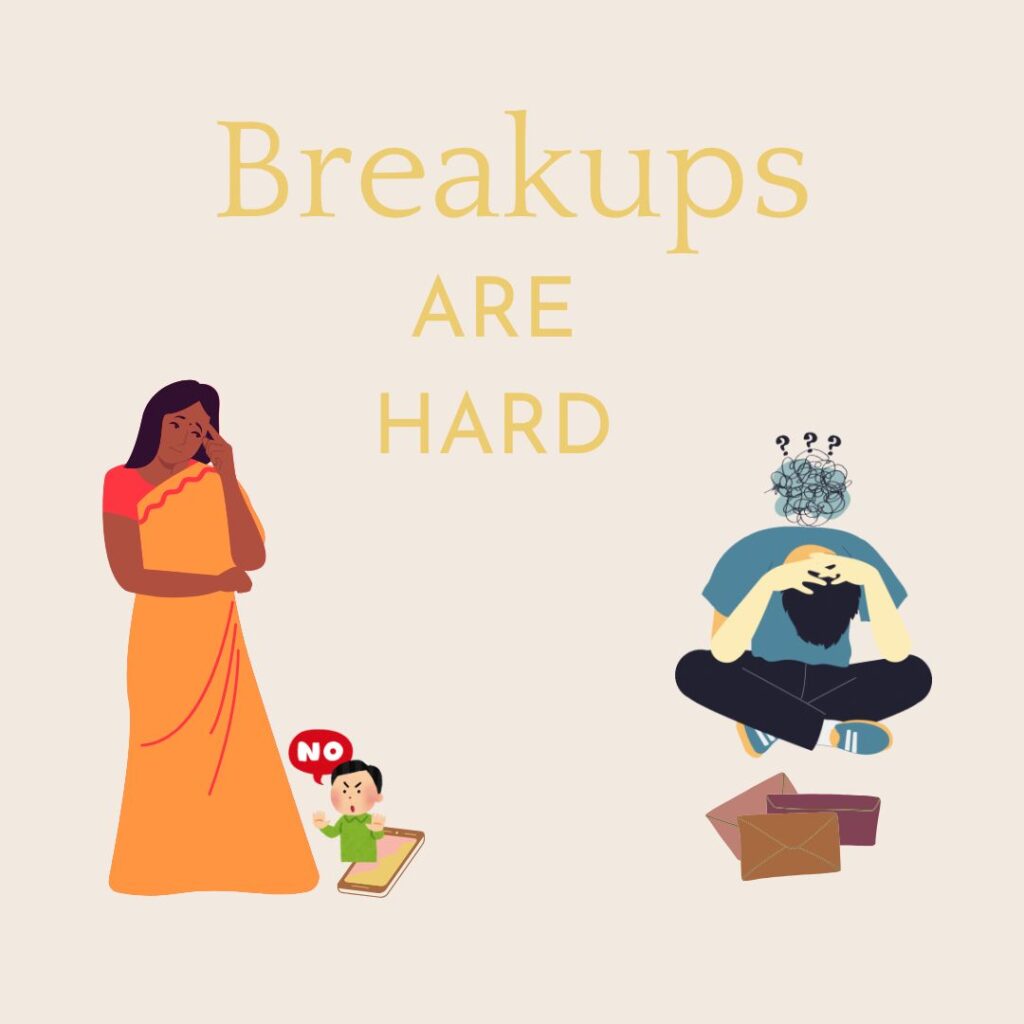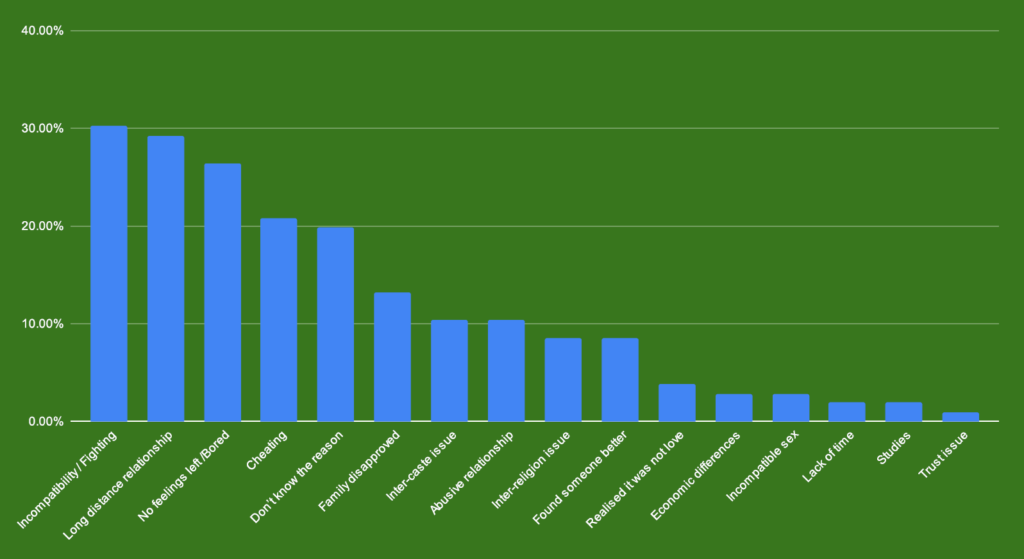
A bad breakup is hard to overcome. Image created using Canva
Heartbreak After a Breakup
Pranjal was extremely depressed. Her marriage date had been set for the next week. Due to several misunderstandings and dowry-related issues, the wedding was called off. Her friends rallied around and took her on a two-week pan-India tour. They took turns keeping an eye on her in the initial days after the wedding was called off, just in case.
Pranjal is not the first or the last Indian woman who would have to face a relationship-related heartbreak. Breakups are hard. A separation or a divorce after marriage is even harder. We will speak about that in a separate article. Here, our relationship experts have weighed in on dealing with a breakup after a long-term relationship.
The Maelstrom of Emotions
Breakups are complex, bringing with them a mix of feelings such as sadness, jealousy, regret, and even relief. Experiencing these is part of the healing process. Suppressing feelings can intensify them, so instead, acknowledge that the pain will lessen over time. Allow yourself to grieve the loss of the relationship, as this acknowledgement is a vital step in moving forward. Grief can be multilayered. It could be about the loss of companionship, shared experiences, and the emotional, social, or financial support the relationship provided. Perhaps even more painful would be the loss of the hopes, dreams, and plans you envisioned together.
You might find it difficult to be as productive at work or take care of others in the way you normally do. This is a natural response to emotional upheaval. Take time to regroup and re-energise. While grief is a natural reaction to a breakup, it is important to distinguish between normal sadness and clinical depression. Grief tends to lessen over time, while depression can leave you feeling stuck and unable to move forward. Symptoms of depression include persistent sadness, loss of interest in activities, and difficulty functioning in daily life. If you suspect depression, seek professional help.
Removing Reminders
Clearing your home of items that remind you of your ex-partner can help reduce emotional triggers. This includes physical objects like photographs, clothes, gifts as well as digital connections on social media platforms. “Implement a ‘no-contact’ period with your ex-partner to create space for healing. If you find yourself checking in on them through social media, set time limits to prevent it from consuming your day,” advises Kamal, our relationship expert. Snooze your social media connections to your ex or delete them. You create space for healing when you minimise contact with her/him. If there are unavoidable interactions, plan ahead to minimise discomfort. In case you intend to remain friends, define clear physical and emotional boundaries to avoid confusion.
Sometimes, people tend to idealise an ex-partner after a breakup, focusing solely on positive memories. To counteract this tendency, make a list of their faults or behaviour that were detrimental to the relationship. Write a letter to your ex listing out whatever you felt had remained unsaid. Do not send it though! This activity provides a more balanced perspective, helping you understand why the relationship may not have been ideal.
Accepting the Reasons for Breakup
Chandra & Parija (2021) studied a small cohort of Indians who had recently gone through a breakup and several factors came up as plausible reasons. The top reasons for breakups were incompatibility, feelings of boredom, long-distance relationships, cheating, and disapproval of family.

Top Reasons for Breakups in India according to the 2021 study.
Now, whatever the reason the breakup happened, it is important to remember that it did happen for a reason. Acceptance is a crucial component of moving forward. Acknowledge that the relationship has ended and understand that lingering on “what ifs” will not do you any good. Embrace the future, focusing on personal growth and the possibilities that lie ahead. Take time to reflect on the relationship. It will provide valuable insights. Consider what you have learned about yourself—your needs and your boundaries. This reflection can inform future relationships and help you make more informed choices.
Asking for Support
In the case study mentioned earlier, Pranjal was lucky to have friends at hand to help her through her emotional turmoil. Reaching out to friends and family provides emotional support and will remind you that you are not alone. When building a support network, it is essential to choose people who are positive and genuinely attentive. Sharing your feelings with trusted individuals can offer a new perspective and decrease your feelings of isolation. Social interactions also serve as a distraction, helping to shift focus away from the breakup. Additionally, therapists and counsellors can offer guidance and personalised coping strategies.
Keeping busy is essential to maintain your equilibrium. Pursue your hobbies or join social activities to keep yourself occupied. If you do not have friends and family nearby to help you, plan a trip or join a class that you had been thinking of taking up. Embarking on a solo adventure, whether travelling to a new destination or exploring a local attraction, can be empowering. Such experiences will help with boosting your self-confidence and provide opportunities for self-discovery—all of which are beneficial during the healing process.
Avoid Unhealthy Coping Mechanisms
It is important to steer clear of negative coping strategies, such as substance abuse, unhealthy eating habits, or isolating oneself. These can increase emotional distress and hinder your healing process. Instead, focus on positive outlets like physical activity, creative pursuits, or volunteering as mentioned above. “Exercise, in particular, can boost endorphin levels, improve mood, and alleviate feelings of sadness or anxiety,” mentions Kamal, our relationship expert. This is a good time to focus on your personal needs through self-care practices such as journaling, exercising, sleeping well, and maintaining proper nutrition. Dedicate time each day to activities that bring you comfort and relaxation, such as walking in a park, listening to music, reading, or enjoying a good movie on OTT.
Remember, falling immediately in love with someone else is also not a solution. A rebound relationship might feel good for a while. Nevertheless, it will do zilch for you in the long-term as your emotions are raw and your issues from your past relationship have not been resolved.
Regrouping All by Yourself
Once you have yourself under emotional control, step back and view the broader picture. How did you contribute to the issues in the relationship? Do you tend to repeat the same mistakes or choose the wrong person time and time again? Reflect on how you react to stress and manage conflict and insecurities. Could you respond more constructively? Consider whether you accept others as they are, rather than how they could or ‘should’ be. Use your negative feelings as a starting point for change. Are you in control of your emotions, or do they control you?
It is important to be honest with yourself during this phase of healing. Try not to focus on blame or punish yourself for past mistakes. As you reflect on the relationship, you learn more about yourself, your interactions with others, and the areas you need to improve. Objectively examining your choices and behaviour, including why you chose your former partner, can help you understand where things went wrong and make better decisions in the future.
Conclusion
When ready, reflect on your relationship. Consider how you have grown, what you have learned about conflict resolution and communication, and identify your non-negotiables for future relationships. Accept past mistakes as opportunities for growth, and use these insights to shape healthier, more fulfilling connections moving forward.
Pranjal was able to come out of her depression and resume her normal life. She married someone else a few years later and is the proud mother of twins. She is thankful that she had great friends who helped her through a markedly bad phase of her life.
Download the Rematch app for more information on dealing with breakups, attractions, and dating advice for long-term relationships.
References
Chandra, Ankit, and Pragyan Paramita Parija. The Love-Breakup Study: Defining Love and Exploring Reasons for the Breakup of Romantic Relationships. 2021.
“Dealing with a Breakup or Divorce.” HelpGuide. Accessed January 15, 2025. https://www.helpguide.org/mental-health/grief/dealing-with-a-breakup-or-divorce.

